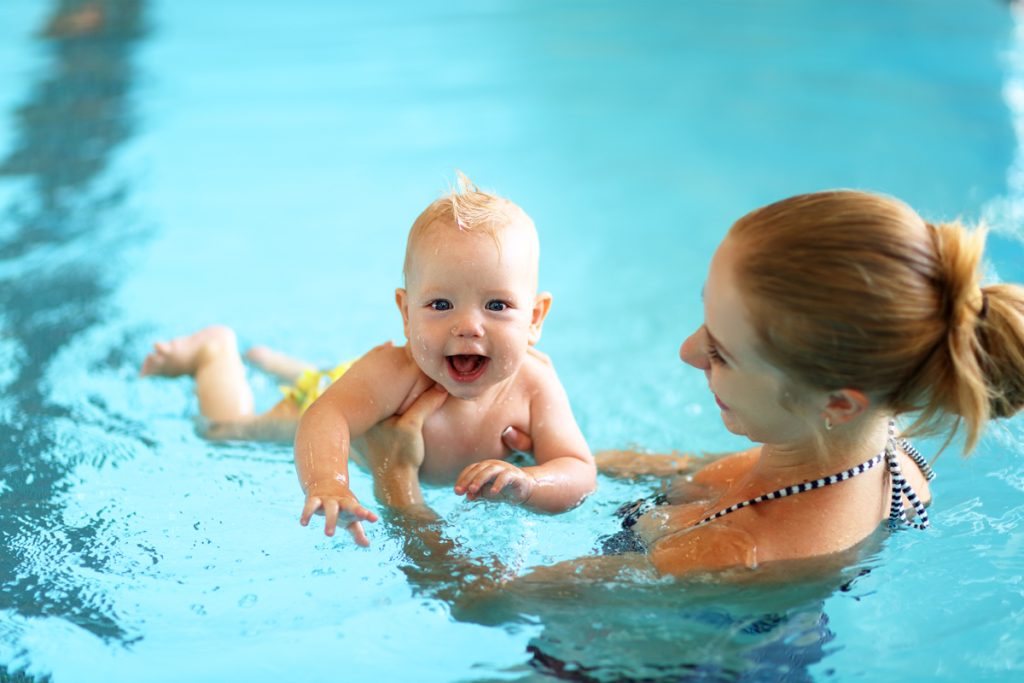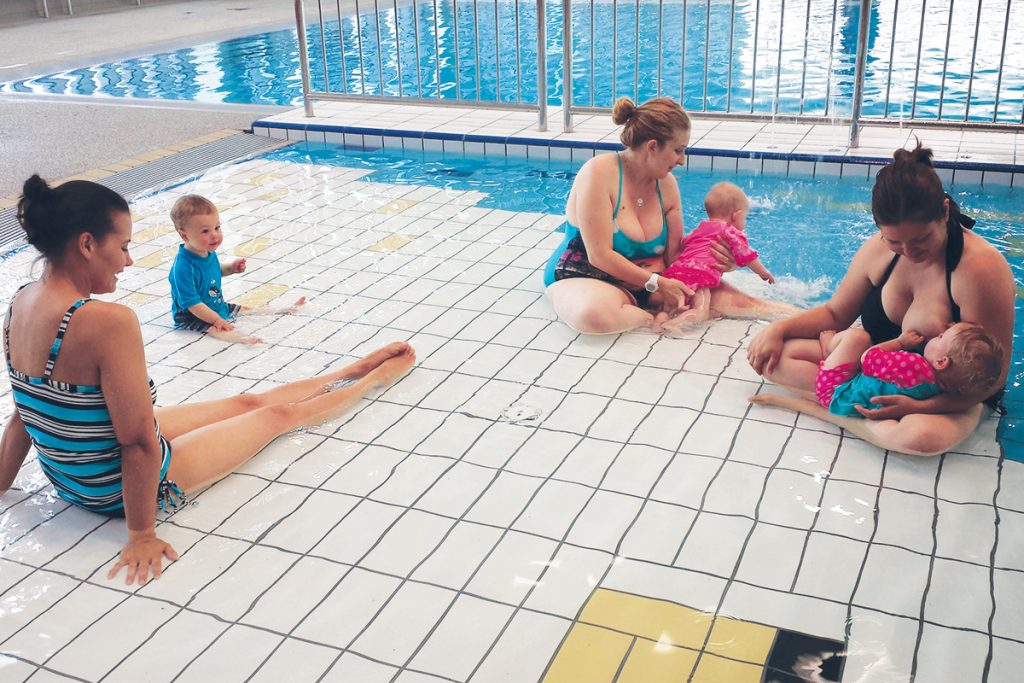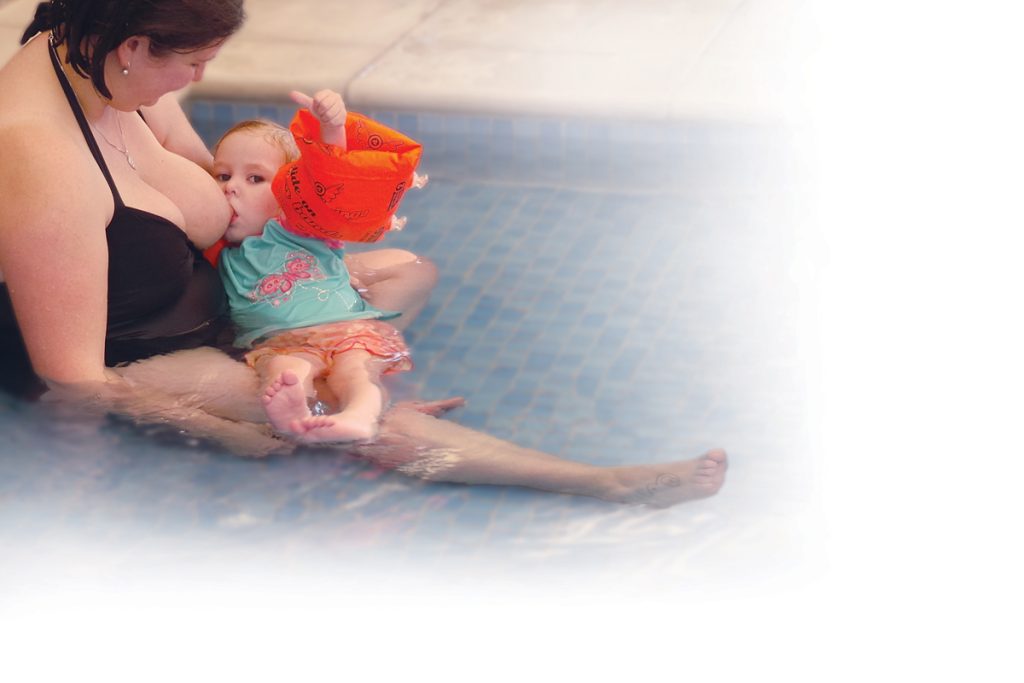By Yvette O’Dowd
Australian mothers are protected by anti-discrimination laws and it is prohibited to tell them to cease breastfeeding, move away to private spaces or cover up when breastfeeding in public places. Both State and Federal laws recognise the right to breastfeed anywhere a mother and child may legally be receiving goods and services.
However, some people are under the misunderstanding that these laws do not apply in the case of swimming pools. So let’s sort the facts from the fiction.
Babies are permitted to use public pools
There are no age restrictions for entry into public pools. While some parents prefer to wait until a child begins their immunisation schedule, there are no rules requiring this. Most swim schools encourage participation in classes from four months of age. Incontinent people, including infants yet to be toilet trained, are generally required to wear some form of swim nappy or underwear.

Breastfeeding women are permitted to use swimming pools
The production of human milk – colostrum – begins around 16 weeks gestation. After childbirth, this transitions to mature milk around 3-7 days postnatally and is continually produced until after weaning. Some women will continue to produce breastmilk for weeks, months or even years after a child ceases to breastfeed.
While some breasts leak milk between breastfeeds, mostly the fluid remains within the breast until the child latches and removes the milk during a feed. Milk might leak from the second breast while a baby feeds on the first. However, mothers can excrete milk independently of the baby and can leak throughout lactation and even while separated from their baby.
There are no restrictions on lactating women using swimming pools. There is no risk to their milk from chemicals or contaminants in the pool water. It is illegal to prohibit a breastfeeding woman from using a swimming pool or other public space because she is breastfeeding.
The recommended period of breastfeeding is at least two years for each child. Pregnancy plus lactation for each birth is therefore almost three years. The season of childbearing can include short or no periods when the breasts are not lactating between births. A mother of three might be in a state of lactation for the best part of a decade.
Breastmilk is not a biohazard
Not everything coming out of the human body is a risk of contamination. Human milk is not a health risk if minute amounts are excreted into pool water. Unlike faecal accidents, swimming pools do not need to be closed and treated if breastmilk enters the water. This includes the small volume a baby might bring up during or after a breastfeed.
Breastfeeding in a body of water doesn’t increase risks to infants
Adults are permitted to hold their child while standing and walking in swimming pools. They are allowed to sit in shallow water holding their babies and to sit on the side of pools holding their child. The act of breastfeeding does not increase the risk of babies drowning, slipping, falling or other accidents. The connection of baby to breast does not distract mothers or make them unable to support their baby.
Breastfeeding is not required to be discreet
It is illegal to require a breastfeeding mother to cover her breasts or baby before, during, or after the act of breastfeeding. The opinions of other pool users is not relevant to the legal rights of the mother to attend to her babies needs. Strangers religious beliefs or values do not invalidate the law.

Breastfeeding cannot be “against the rules”
Businesses providing goods or services to the public reserve the right to have rules of conduct on their premises. However, law overrides any such rules which might be proven to breach the rights protected by anti-discrimination law. If a facility had a written policy or signage implying women were not permitted to use the public facility during the act of breastfeeding, the Human Rights Commission would have grounds to find them in breach of the law.
A precedent regarding this was set in 2011 when a mother’s complaint was conciliated by the Human Rights Commission. In this case, the management of the public pool issued the mother an apology, undertook appropriate training for their staff, and changed their policy and practice in this area.”
The complainant claimed that when she breastfed her baby at the respondent’s public swimming pool she was told to stop because of council regulations regarding bodily fluids entering the pool.
On being notified of the complaint the respondent indicated a willingness to try to resolve the matter by conciliation.
The complaint was resolved. The respondent agreed to work with a national breastfeeding association to develop and implement policies and training for staff on breastfeeding by members of the public. The respondent acknowledged that it should not have raised the issue of the appropriateness of breastfeeding and issued the complainant with an apology for any hurt, humiliation or embarrassment caused by the incident. The respondent advised that the complainant was welcome to return to the pool and breastfeed her baby.
No food or drink in the pool!
This is sometimes stated as a reason a mother cannot breastfeed in the swimming pool. However, the breast is the “container” of the breastfed baby’s food and drink. It isn’t going to be dropped, spill open or break apart!
So why do we hear reports of women being told they cannot breastfeed in pools?
In many cases, misinformed staff members make judgements which are not supported by management or policy. In the majority of cases, apologies are made to mothers who have experienced discrimination and staff undergo additional training.
Very young infants cannot regulate their own body temperature, so removing them from the warmth of the pool to sit on the side of the pool or nearby seating can lead to rapid cooling. A mother would need to dry and dress herself and her child (and any older children) before finally sitting down to feed her newborn, which would result in distress and a lot of very loud crying!
Breastfeeding is welcome everywhere!
Yvette O’Dowd is not your typical grandmother! This mother of three and ‘Granny’ of three has been a breastfeeding counsellor since 1992. In 2014, Yvette established the Southern Natural Parenting Network, incorporating South Eastern Babywearing Group. With 11,000 members world-wide, the group supports parents interested in breastfeeding, babywearing, co-sleeping, baby-led weaning and modern cloth nappies and other aspects of gentle, natural parenting.


